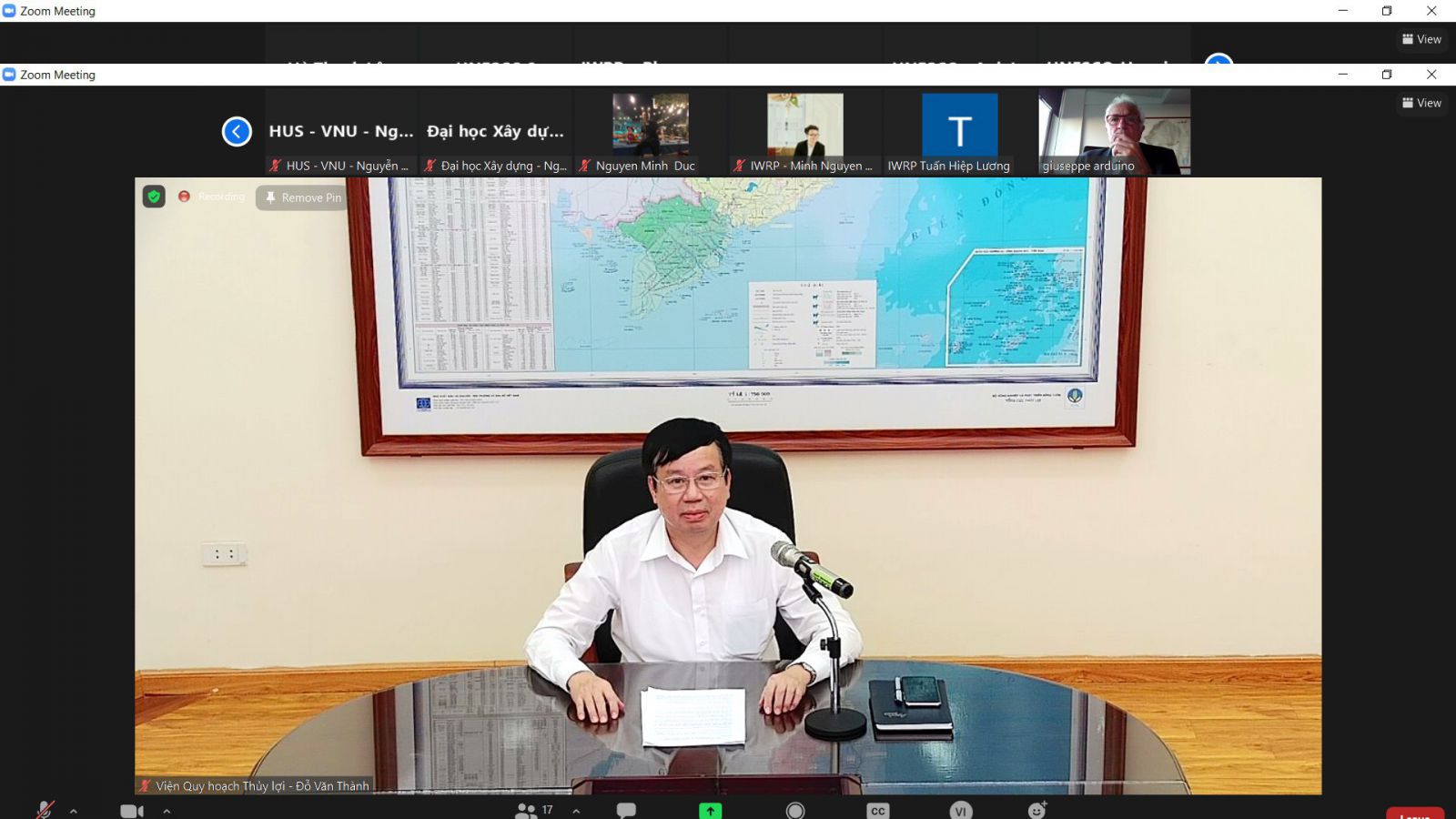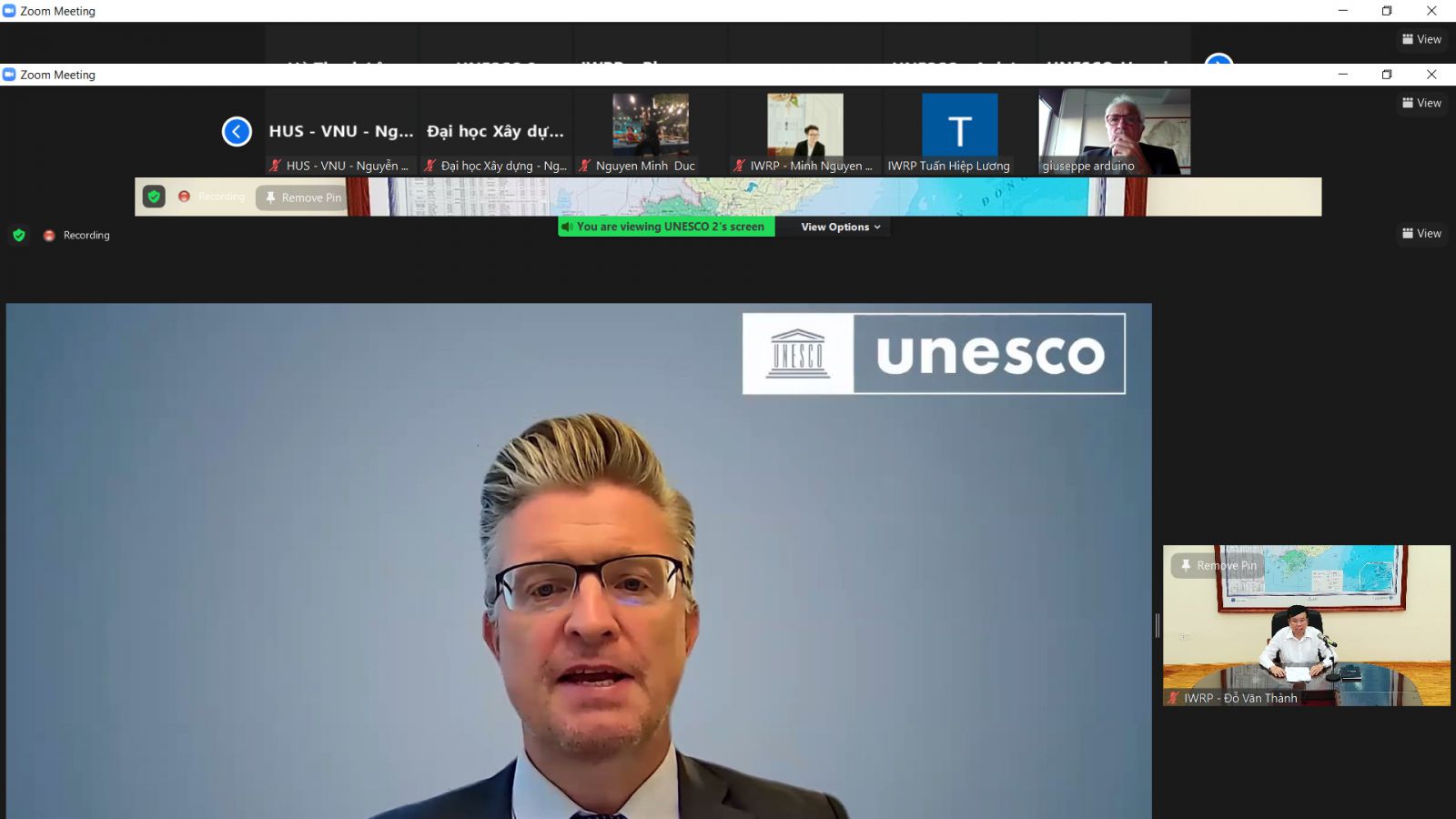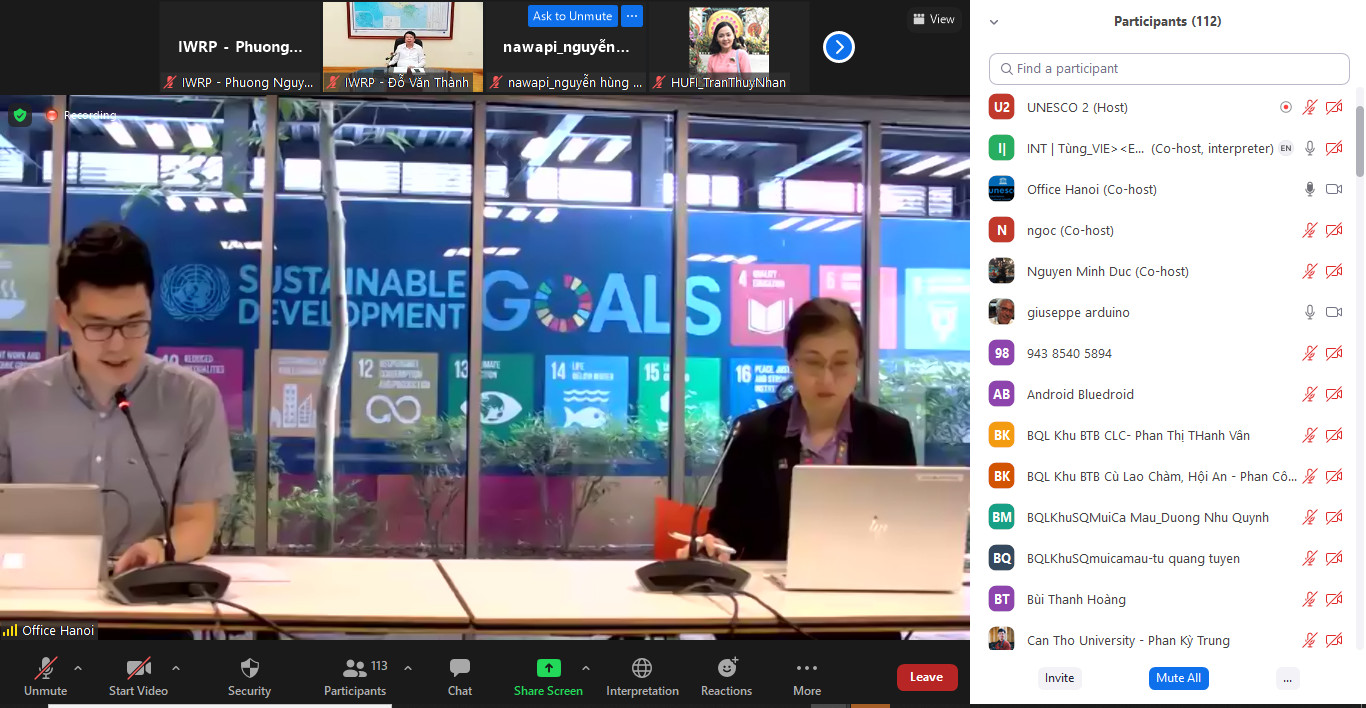The Training Program "Eco-Hydrology in Integrated Water Resources Management in Adapting to Climate Change" opened
On September 6, 2021, the Institute of Water Resources Planning (IWRP) in collaboration with the United Nations Educational, Scientific and Cultural Organization (UNESCO) opened the online training program "Eco-Hydrology in Integrated Water Resources Management in Adapting to Climate Change”. This is a training program within the framework of the Intergovernmental Hydrographic Program IHP VIII: Water Security for Sustainable Development, period 2014-2021 of UNESCO.
Attending the opening ceremony were Mr. Do Van Thanh, Director of the IWRP together with his staff of the Division for Training and International Cooperation, Dr. Hans Thulstrup from UNESCO Asia Pacific region, Mr. Giuseppe Arduino - Head of Ecology Department, UNESCO Paris, Dr. Maciej Zalewski, Director of the European Center for Hydro-Ecology, UNESCO, and Ms. Tran Lan Huong, UNESCO Vietnam. The course attracted the attendence of more than 100 participants from Ministries and sectors (Ministries of Agriculture and Rural Development, Natural Resources and Environment, and Industry and Trade, Academy of Science and Technology, Vietnam Union of Science and Technology Associations), international organizations , NGOs, Research Institutes, Universities, Departments of Agriculture and Rural Development, Natural Resources and Environment, Industry and Trade, National Parks, Nature Reserve Management Boards from 11 provinces and cities of Vietnam.
The training program aimed to: (i) provide knowledge and new approaches related to eco-hydrology and sustainable management of aquatic ecosystems in integrated water resources management towards water security in the context of climate change; and (ii) share international and regional experiences on eco-hydrological application in water resource management and applicability of demonstration sites in Vietnam.

Mr. Do Van Thanh, Director of the IWRP opened the training
Speaking at the opening, Mr. Do Van Thanh, Director of the IWRP said that the training program is an opportunity for the trainees to learn and improve their knowledge of eco-hydrology, thereby apply in their job. He valued the UNESCO Eco-Hydrology Program as a very meaningful initiative, contributing to building momentum, forming a scientific knowledge base and fostering the political will to promote a global strategy in responding to the challenges of hydrology, ecology and climate change adaptation. At the same time, he expressed the IWRP's interest in specific cooperation with UNESCO's Eco-Hydrology Program in order to develop a new, strategic and holistic approach to address the challenges in water resources and hydraulic work planning in Vietnam in ensuring the harmony of technical, economic, social and environmental pillars.
“The IWRP always strives to be a reliable and responsible partner in activities led by UNESCO in general and the Eco-Hydrology Program in particular, especially activities related to promoting water security, Integrated Water Resources Management (IWRM), and enhancing resilience and adaptability to the impacts of climate change”, Mr. Do Van Thanh affirmed.
On the UNESCO side, Dr. Hans Thulstrup – UNESCO Asia Pacific region highly appreciated Vietnam's active participation in UNESCO's programs and wished to continue to cooperate with agencies, organizations and scientists, including the IWRP in developing and implementing activities under the Eco-Hydrology Program in the future.

Dr. Hans Thulstrup – UNESCO Asia Pacific region spoke at the opening.
The training program "Eco-Hydrology in Integrated Water Resources Management in Adapting to Climate Change" takes place online on September 6-7, and on September 16-17, 2021.

Mr. Ha Thanh Lan, Head of the Division for Training and International Cooperation of the IWRP gave lecture at the training.
For more information about the training program, please contact: htqt@iwrp.gov.vn.
Information about UNESCO's Eco-Hydrology Program
The Ecological Hydrology Program has been developed and implemented by UNESCO since 2008, within the overall International Hydrographic Program (IHP). The focus of UNESCO's Ecological Hydrology Program is to improve understanding of hydrological and ecological processes at the basin scale, thereby "building a scientific basis and systematic solutions, socially acceptable and economically viable solutions to the problem of sustainable management of freshwater resources”. The solutions targeted by the Program include institutions, policies, planning and specific practice applications.
The Eco-Hydrology Program also aims to promote Water Security, Integrated Water Resources Management (IWRM), and enhance adaptation and resilience to the impacts of climate change.
(Source: UNESCO Ecohydrology Programme, 2021)
- IWRP collaborates with the International Water Centre (IWC) of Griffith University, Australia, on Remote Sensing for Agricultural Water Management
- IWRP and a delegation of South Korean experts held discussions on the project "Establishment of Intergrated Water Resources Information Management System in the Ma River Basin of Central Vietnam (Thanh Hoa Province)."
- How Vegetation and Water Help Cool the Air
- IWRP and IHI (Japan) discuss cooperation opportunities in water resource management and disaster prevention
- Sustainable Water Management - Participatory Cooperation Framework Towards Managing Water-Related Risks
- Join us in creating a participatory cooperation framework to effectively manage water – related risks!
- Building Climate Resilience: Tailored Training on Embracing Nature-Based Solutions in Vietnam, Sponsored by Nuffic.
- The technical exchange seminar discussed the scientific and technological task outlined in the memorandum between Japan, Indonesia, and Vietnam titled "Development of machine learning and remote sensing-based water management platform for sustainable agri
- Invitation to Participate in the e-Asia Project Workshop: Advancing Water Management Platforms in Asian Deltas
- Young Professionals for Sustainable Water Resources Forum 2023 (YP4W Forum 2023)
- IWRP met experts of the FAO Water Scarcity Program (WSP) for Asia-Pacific
- YP4W FORUM 2023 - CALL FOR REGISTRATION
- MOU signed between the IWRP and the Russian State Hydrometeorological University (RSHU)
- Meeting with the Regional Director of Erhard Muhr GmbH (Germany)
- First Secretary of the Embassy of Japan in Vietnam meets the IWRP’s leaders on the occasion of ending his working term





















